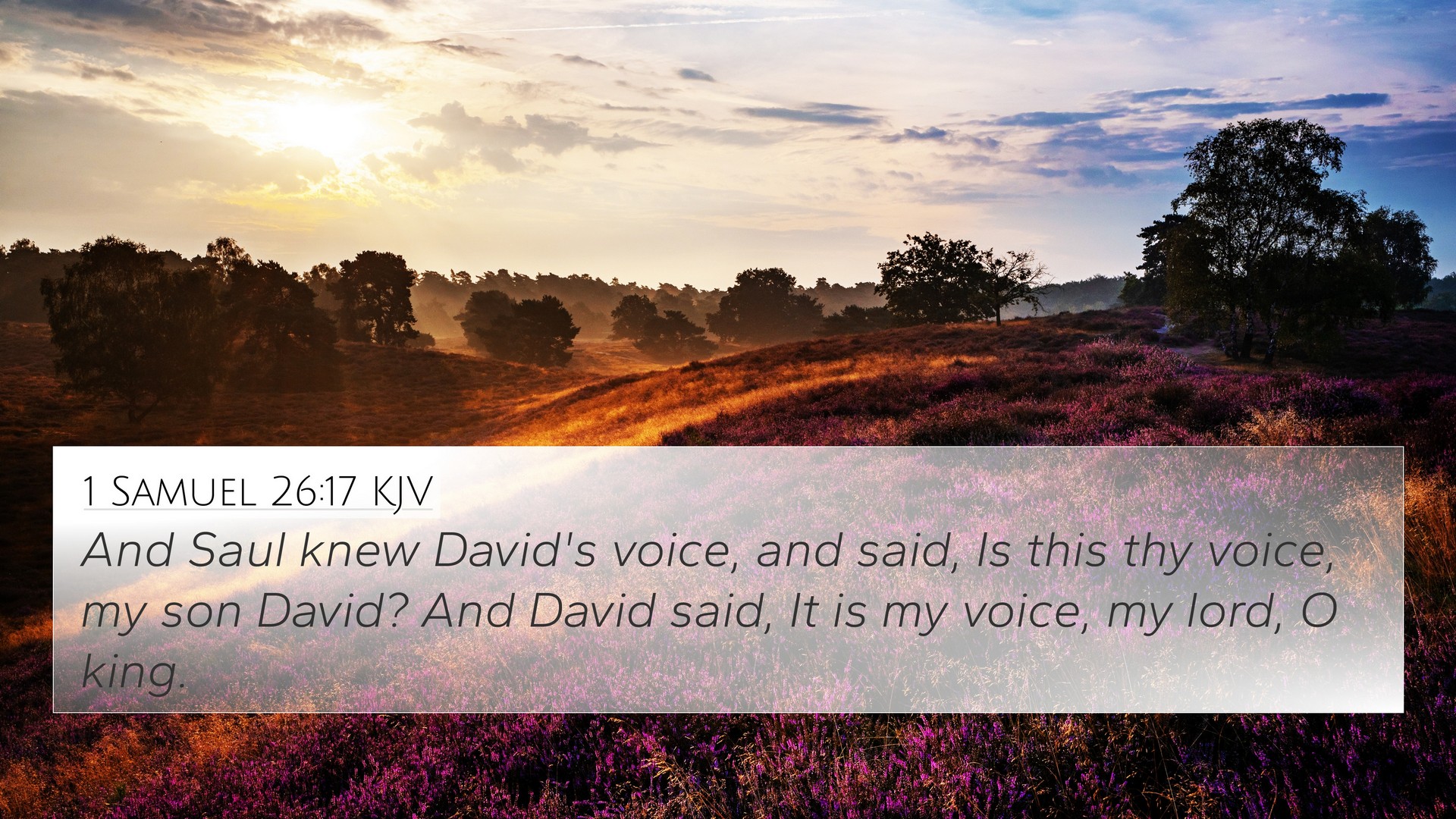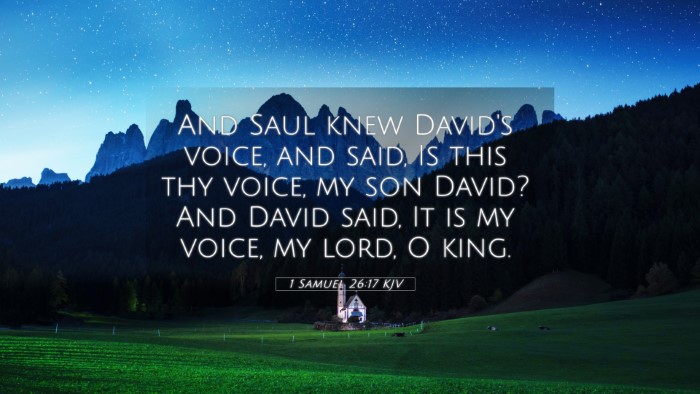Understanding 1 Samuel 26:17
1 Samuel 26:17 states, "And Saul knew David's voice, and said, Is this thy voice, my son David? And David said, It is my voice, my lord, O king." This moment encapsulates a profound dialogue between King Saul and David, revealing themes of recognition, familial connection, and the complicated dynamic of power and mercy.
Verse Meaning and Analysis
This verse marks a significant moment in the ongoing narrative of David's rise and Saul's decline. The dialogue signifies not only personal acknowledgment but also political and spiritual implications. In this exchange, we see a convergence of various themes:
- Recognition: Saul's immediate recognition of David's voice illustrates the deep relationship and past intimacy between them.
- Conflict Resolution: David, despite being persecuted, shows respect, further indicating his integrity and noble character.
- Divine Providence: This moment reassures us of God's sovereignty, operating between these two key figures in Israel's history.
Commentary Insights
Commentaries from revered theologians such as Matthew Henry, Albert Barnes, and Adam Clarke shed light on this text:
Matthew Henry's Commentary
Henry emphasizes the mercy of God in David's life, noting how David’s sparing of Saul's life illustrates his moral strength. Saul's reference to David as "my son" displays the emotional turmoil of their relationship amidst external conflict.
Albert Barnes' Commentary
Barnes highlights the significance of this encounter as a turning point in their relationship, symbolizing the shift from enmity to a potential understanding. He also draws attention to the deeper implications of mercy and humility as seen through David’s response.
Adam Clarke's Commentary
Clarke adds that Saul's call to David signifies a recognition of David's rightful position and a complicated mixture of regret and realization on Saul's part. This exchange serves as a reminder of the power of words in reconciling relationships.
Bible Verse Cross-References
Connections with other Bible verses deepen our understanding of 1 Samuel 26:17. Here are some relevant cross-references:
- 1 Samuel 24:16-17 - Saul acknowledges David’s integrity after David spares his life in the cave.
- 1 Samuel 27:1 - David expresses despair about Saul’s pursuit, hinting at the turmoil of their ongoing conflict.
- Psalm 7:1-2 - A reflection of David’s plea for deliverance and a demonstration of trust in the Lord amidst danger.
- 1 Samuel 15:11 - The rejection of Saul as king illustrates the consequences of disobedience, setting the stage for David's rise.
- Matthew 5:44 - Jesus’ teaching on loving and praying for enemies resonates with David's mercy towards Saul.
- Romans 12:19 - The principle of leaving vengeance to God reflects David's actions in this narrative.
- Proverbs 20:22 - Encourages trusting God for eventual vindication rather than taking matters into one’s own hands.
- 1 Peter 3:9 - A call to bless others despite being wronged, highlighting the New Testament echo of David’s character.
- Matthew 10:36 - Jesus mentions that a man's enemies will be from his own household, paralleling the familial complexity in David and Saul's relationship.
- Psalm 37:23-24 - The Lord’s guidance and support for the righteous ties back to David’s dependence on God through adversities.
Thematic Connections
Analyzing this verse in conjunction with others facilitates a broader understanding of biblical themes, such as:
- Mercy and Grace: The contrast between David’s mercy and Saul’s aggression exemplifies the ongoing struggle between good and evil.
- Authority and Leadership: David’s interactions with Saul provide an insight into God’s choice of leaders based on their hearts rather than their backgrounds.
- Human Relationships: The complexity of Saul and David’s relationship showcases the ramifications of jealousy, insecurity, and unyielding love.
Conclusion
The interaction in 1 Samuel 26:17 is layered with meaning and significance that goes beyond the historical context, extending into moral and theological reflections relevant to contemporary life. Understanding this verse through public domain commentaries and Bible verse cross-referencing enriches our comprehension of God's word and provides a deeper sense of connection to biblical narratives.




